 Want to read some great works of world literature in English translation? Then check out this month’s collection spotlight, which is located on the first floor of Perkins Library, next to the Perkins Service Desk. The books listed below are examples of what you will find, organized by world region.
Want to read some great works of world literature in English translation? Then check out this month’s collection spotlight, which is located on the first floor of Perkins Library, next to the Perkins Service Desk. The books listed below are examples of what you will find, organized by world region.
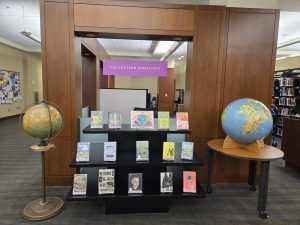
=========
AFRICA
==========
 No Edges: Swahili Stories San Francisco : Two Lines Press, 2023. (multiple authors and translators)
No Edges: Swahili Stories San Francisco : Two Lines Press, 2023. (multiple authors and translators)
The first collection of Swahili fiction in English translation, No Edges introduces eight East African writers from Tanzania and Kenya as they share tales of sorcerers, Nairobi junkyards, cross-country bus rides, and spaceships that blast prisoners into eternity. Here we’re encouraged to explore the chaos of life on a crowded Earth, as well as the otherworldly realms lying just beyond our reach. Through language bursting with rhythm and vivid Africanfuturist visions, these writers summon the boundless future into being [From the Publisher].
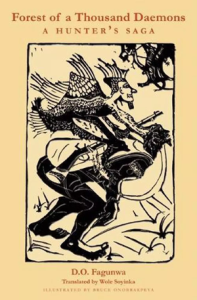 Wole Soyinka. The forest of a thousand daemons: a hunter’s saga; being a translation [from Yoruba] of ‘Ogboju ode ninu igbo irunmale’ by D.O. Fagunwa; illustrated by Bruce Onabrakpeya. London, Nelson, 1968.
Wole Soyinka. The forest of a thousand daemons: a hunter’s saga; being a translation [from Yoruba] of ‘Ogboju ode ninu igbo irunmale’ by D.O. Fagunwa; illustrated by Bruce Onabrakpeya. London, Nelson, 1968.
This is a picaresque novel in which we follow the adventures of Adara-Oogun, the son of a witch and a brave hunter as he travels into a forest full of supernatural creatures. Praised as the first full-length Yoruba novel, it was originally published as Ogboju Ode ninu Igbo Irunmale (Lagos, Nigeria: Church Missionary Society, 1938) [From Oxford Bibliographies: African Studies].
 Balaraba Ramat Yakubu. Sin is a puppy that follows you home; translated from the Hausa by Aliyu Kamal. Chennai : Published by Blaft Publications in association with Tranquebar Press, 2012.
Balaraba Ramat Yakubu. Sin is a puppy that follows you home; translated from the Hausa by Aliyu Kamal. Chennai : Published by Blaft Publications in association with Tranquebar Press, 2012.
Beginning in the late 1980s, northern Nigeria saw a boom in popular fiction written in the Hausa language. Known as “love literature” (littattafan soyayya), the books are often inspired by Hindi films—which have been hugely popular among Hausa speakers for decades—and are primarily written by women. They have sparked a craze among young adult readers as well as a backlash from government censors and book-burning conservatives. Sin Is a Puppy That Follows You Home is an Islamic soap opera complete with polygamous households, virtuous women, scheming harlots, and black magic. It’s the first full-length novel by a woman ever translated from Hausa to English. And it’s quite unlike anything you’ve ever read before. [From the publisher]
======
CHINA
=======
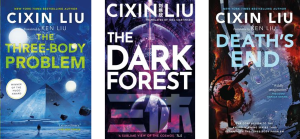 The Rememberance of Earth’s Past Trilogy; authored by Liu, Cixin=刘慈欣; translated by Ken Liu=刘宇昆;
The Rememberance of Earth’s Past Trilogy; authored by Liu, Cixin=刘慈欣; translated by Ken Liu=刘宇昆;
The trilogy, a hard science fiction, is widely considered “a mind-bending epic” and “wildly imaginative” by Barack Obama. It is also famous for its realistic depiction of the story’s backdrop from China’s Cultural Revolution era to contemporary China. The first book The Three-body Problem won the 2015 Hugo Award, the first Hugo novel winner penned by an Asian author. A Netflix Original Series based on this trilogy was released in March 2024. The publisher describes them as follows:
- The Three-body Problem New York : Tor Books, 2014.
“Set against the backdrop of China’s Cultural Revolution, a secret military project sends signals into space to establish contact with aliens. An alien civilization on the brink of destruction captures the signal and plans to invade Earth. Meanwhile, on Earth, different camps start forming, planning to either welcome the superior beings and help them take over a world seen as corrupt, or to fight against the invasion. The result is a science fiction masterpiece of enormous scope and vision.” - The Dark Forest . London : Head of Zeus, an AdAstra book, 2021.
“Imagine the universe as a forest, patrolled by numberless and nameless predators. In this forest, stealth is survival – any civilisation that reveals its location is prey. Earth has. Now the predators are coming. Crossing light years, the Trisolarians will reach Earth in four centuries’ time. But the sophons, their extra-dimensional agents and saboteurs, are already here. Only the individual human mind remains immune to their influence. This is the motivation for the Wallfacer Project, a last-ditch defence that grants four individuals almost absolute power to design secret strategies, hidden through deceit and misdirection from human and alien alike. “ - Death’s End . New York : Tor, [2016].
“Half a century after the Doomsday Battle, the uneasy balance of Dark Forest Deterrence keeps the Trisolaran invaders at bay. Earth enjoys unprecedented prosperity due to the infusion of Trisolaran knowledge. With human science advancing daily and the Trisolarans adopting Earth culture, it seems that the two civilizations will soon be able to co-exist peacefully as equals without the terrible threat of mutually assured annihilation. But the peace has also made humanity complacent.”
========
JAPAN
=========
 Mieko Kawakami. Breasts and Eggs; translated from the Japanese by Sam Bett and David Boyd. New York, NY : Europa Editions, 2020.
Mieko Kawakami. Breasts and Eggs; translated from the Japanese by Sam Bett and David Boyd. New York, NY : Europa Editions, 2020.
Breasts and Eggs paints a portrait of contemporary womanhood in Japan and recounts the intimate journeys of three women as they confront oppressive mores and their own uncertainties on the road to finding peace and futures they can truly call their own. It tells the story of three women: the thirty-year-old Natsu, her older sister, Makiko, and Makiko’s daughter, Midoriko. Makiko has traveled to Tokyo in search of an affordable breast enhancement procedure. She is accompanied by Midoriko, who has recently grown silent, finding herself unable to voice the vague yet overwhelming pressures associated with growing up. Her silence proves a catalyst for each woman to confront her fears and frustrations. [From the publisher]
 Maru Ayase. The Forest Brims Over; translated from the Japanese by Haydn Trowell. Berkeley, CA : Counterpoint, 2023.
Maru Ayase. The Forest Brims Over; translated from the Japanese by Haydn Trowell. Berkeley, CA : Counterpoint, 2023.
Nowatari Rui has long been the subject of her husband’s novels, depicted as a pure woman who takes great pleasure in sex. With her privacy and identity continually stripped away, she has come to be seen by society first and foremost as the inspiration for her husband’s art. When a decade’s worth of frustrations reaches its boiling point, Rui consumes a bowl of seeds, and buds and roots begin to sprout all over her body. Instead of taking her to a hospital, her husband keeps her in an aquaterrarium, set to compose a new novel based on this unsettling experience. But Rui breaks away from her husband by growing into a forest—and in time, she takes over the entire city. As fantasy and reality bleed together, The Forest Brims Over challenges unconscious gender biases and explores the boundaries between art and exploitation—muse abuse—in the literary world. [From the publisher]
==========================
SOUTH & SOUTHEAST ASIA
==========================
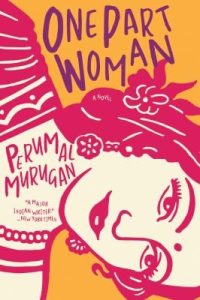 Perumal Murugan. One part woman; translated from the Tamil by Aniruddhan Vasudevan. New York : Black Cat, 2018.
Perumal Murugan. One part woman; translated from the Tamil by Aniruddhan Vasudevan. New York : Black Cat, 2018.
Selling over 100,000 copies in India, where it was published first in the original Tamil and then in a celebrated translation by Penguin India, Perumal Murugan’s One Part Woman has become a cult phenomenon in the subcontinent, captivating Indian readers and jump-starting conversations about caste and female empowerment. Set in South India during the British colonial period but with powerful resonance to the present day, One Part Woman tells the story of a couple, Kali and Ponna, who are unable to conceive, much to the concern of their families—and the crowing amusement of Kali’s male friends. Wryly amusing, fable-like, and deeply poignant, One Part Woman is a powerful exploration of a loving marriage strained by the expectations of others, and an attack on the rigid rules of caste and tradition that continue to constrict opportunity and happiness today.
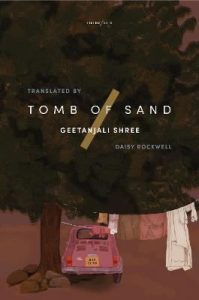 Geetanjali Shree. Tomb of Sand; translated [from Hindi] by Daisy Rockwell. London : Tilted Axis Press, 2021.
Geetanjali Shree. Tomb of Sand; translated [from Hindi] by Daisy Rockwell. London : Tilted Axis Press, 2021.
An eighty-year-old woman slips into a deep depression at the death of her husband, then resurfaces to gain a new lease on life. Her determination to fly in the face of convention – including striking up a friendship with a hijra (trans) woman – confuses her bohemian daughter, who is used to thinking of herself as the more ‘modern’ of the two. At the older woman’s insistence, they travel back to Pakistan, simultaneously confronting the unresolved trauma of her teenage experiences of Partition, and re-evaluating what it means to be a mother, a daughter, a woman, a feminist. Rather than respond to tragedy with seriousness, Geetanjali Shree’s playful tone and exuberant wordplay results in a book that is engaging, funny, and utterly original, at the same time as being an urgent and timely protest against the destructive impact of borders and boundaries, whether between religions, countries, or genders.
=================
LATIN AMERICA
=================
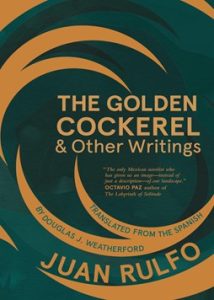 Juan Rulfo. The Golden Cockerel & Other Writings, translated from the Spanish, with an introduction and additional materials, by Douglas J. Weatherford. Dallas, Texas : Deep Vellum Publishing, 2017.
Juan Rulfo. The Golden Cockerel & Other Writings, translated from the Spanish, with an introduction and additional materials, by Douglas J. Weatherford. Dallas, Texas : Deep Vellum Publishing, 2017.
The legendary title novella from one of Mexico’s most influential writers is published here in English for the first time on the 100th anniversary of his birth. This lost masterwork, collected with his previously untranslated stories, marks a landmark event in world literature. [From the publisher].
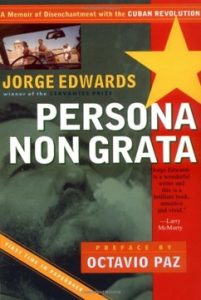 Jorge Edwards. Persona non grata: an envoy in Castro’s Cuba; translated from the Spanish by Colin Harding. London : Bodley Head, 1977.
Jorge Edwards. Persona non grata: an envoy in Castro’s Cuba; translated from the Spanish by Colin Harding. London : Bodley Head, 1977.
In 1970 Jorge Edwards was sent by socialist Chilean President Salvador Allende as his country’s first envoy to break the diplomatic blockade that had sealed Cuba for over a decade. His arrival coincided with the turning point of the revolution, when Castro began to repress the very intellectuals he once courted. In Kafkaesque detail, Edwards records the four explosive months he spent in Havana trying to open a Chilean embassy and his disenchantment with the revolution. His stay culminated in the arrest of his friend Heberto Padilla—the first imprisonment of a well-known writer by the regime—for giving Edwards a “negative view of the revolution.” In a menacing midnight political debate with Edwards immediately after Padilla’s arrest, Castro argued that in this phase of the revolution, bourgeois writers would no longer have “anything to do in Cuba.” Castro accused Edwards of “conduct hostile to the revolution” and declared him “persona non grata.” The winner of the Cervantes prize—the Spanish language equivalent to the Nobel Prize for literature—Jorge Edwards’ memoir splendidly recounts this time and the wrath of Castro. [From Nation Books].
==============
MIDDLE EAST
==============
 Adani Shibli. Minor Detail. translated by Elisabeth Jaquette. New York : New Directions Publishing Corporation, 2020.
Adani Shibli. Minor Detail. translated by Elisabeth Jaquette. New York : New Directions Publishing Corporation, 2020.
Minor Detail begins during the summer of 1949, one year after the war that the Palestinians mourn as the Nakba—the catastrophe that led to the displacement and exile of some 700,000 people—and the Israelis celebrate as the War of Independence. Israeli soldiers murder an encampment of Bedouin in the Negev desert, and among their victims they capture a Palestinian teenager and they rape her, kill her, and bury her in the sand. Many years later, in the near-present day, a young woman in Ramallah tries to uncover some of the details surrounding this particular rape and murder, and becomes fascinated to the point of obsession, not only because of the nature of the crime, but because it was committed exactly twenty-five years to the day before she was born. Adania Shibli masterfully overlays these two translucent narratives of exactly the same length to evoke a present forever haunted by the past. [From the publisher]
 Laila El-Haddad & Maggie Schmitt. The Gaza Kitchen: A Palestinian Culinary Journey. Charlottesville, Virginia : Just World Books, [2016].
Laila El-Haddad & Maggie Schmitt. The Gaza Kitchen: A Palestinian Culinary Journey. Charlottesville, Virginia : Just World Books, [2016].
This award-winning, full-color cookbook shares with readers the little-known but distinctive cuisine of the Gaza region of Palestine, presenting 130 recipes collected by the authors from Gaza. Featuring an enticing array of Palestinian dishes, The Gaza Kitchen also serves as an extraordinary introduction to daily life in the embattled Gaza Strip. It is a window into the intimate everyday spaces that never appear in the news.
 David Grossman. A horse walks into a bar; translated [from the Hebrew] by Jessica Cohen. New York : Alfred A. Knopf, 2017.
David Grossman. A horse walks into a bar; translated [from the Hebrew] by Jessica Cohen. New York : Alfred A. Knopf, 2017.
This novel about a cynical comedian who deals with childhood traumas and his family’s Holocaust memories during a public appearance won the International Booker Prize in 2017 — making Grossman the first Israeli author to win the prestigious literary award. “Continuing his investigations into how people confront life’s capricious battering, and how art may blossom from it, Grossman delivers a stunning performance in this memorable one-night engagement (jokes in questionable taste included).” [From the publisher].
=================
EASTERN EUROPE
=================
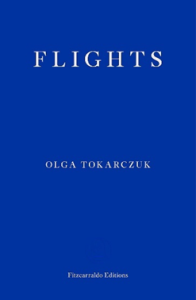 Olga Tokarczuk, Flights; translated [from the Polish] by Jennifer Croft. London, United Kingdom: Fitzcarraldo Editions, 2017. 411 pages : illustrations, maps ; 20 cm.
Olga Tokarczuk, Flights; translated [from the Polish] by Jennifer Croft. London, United Kingdom: Fitzcarraldo Editions, 2017. 411 pages : illustrations, maps ; 20 cm.
This International Booker Prize-winning collection of fictional vignettes about what it means to be a traveler—”a body in motion not only through space but through time”—was written by Olga Tokarczuk (b. 1962), one of Poland’s most acclaimed contemporary authors and the winner of the 2018 Noble Prize in Literature. Tokarczuk’s books available in English include the historical novel Primeval and Other Times, the murder mystery Drive Your Plow Over the Bones of the Dead, and her magnum opus, The Books of Jacob.
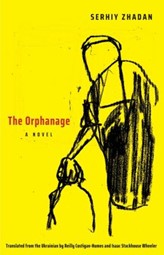 Serhiy Zhadan, The Orphanage: a novel; translated from the Ukrainian by Reilly Costigan-Humes and Isaac Stackhouse Wheeler (New Haven: Yale University Press, 2021).
Serhiy Zhadan, The Orphanage: a novel; translated from the Ukrainian by Reilly Costigan-Humes and Isaac Stackhouse Wheeler (New Haven: Yale University Press, 2021).
This novelistic account of the struggle of civilians caught up in the military conflict in eastern Ukraine was written by Serhiĭ Z͡Hadan (b. 1974), one of Ukraine’s most celebrated contemporary writers and nominee for the 2022 Nobel Prize in Literature. Z͡Hadan’s books available in English include What We Live for, What We Die For: Selected Poems, Sky Above Kharkiv: Dispatches from the Ukrainian Front, and How Fire Descends: New and Selected Poems. You can also listen to him sing (in Ukrainian) along with his punk rock band, Zhadan and the Space Dogs.
=================
WESTERN EUROPE
=================
 Jenny Erpenbeck, Visitation; translated from the German by Susan Bernofsky. London: Portobello, 2010.
Jenny Erpenbeck, Visitation; translated from the German by Susan Bernofsky. London: Portobello, 2010.
Jenny Erpenbeck is a popular German author whose books held at Duke are frequently checked out. This brief novel, the translation of a best seller in Germany, covers the sweep of the 20th century through the story of a small piece of land bordering a lake outside Berlin. The tale’s origins seem folkloric but begin only 100 years before, when one of the landowner’s daughters goes mad and wanders shoeless along the shore. An architect purchases the property and builds a unique home with intricate closets, a painted antique door, and stained-glass windows. The house next door is owned by a Jewish family; caught up in the nightmare of the Holocaust, some escape, some do not. The house survives invading Soviets, but the Communist takeover, the moribund economy that results, and ownership disputes that leave the house empty and unmaintained for years finally destroy it and the family connections it forged. Review Author: Reba Leiding. Date: Sept. 15, 2010 From: Library Journal (Vol. 135, Issue 15).
 Annie Ernaux. Happening; translated from the French by Tanya Leslie. New York, NY : Seven Stories Press, 2019.
Annie Ernaux. Happening; translated from the French by Tanya Leslie. New York, NY : Seven Stories Press, 2019.
In 1963, Annie Ernaux, 23 and single, realises she is pregnant. Shame arises in her like a plague. Understanding that her pregnancy will mark her and her family as social failures, she knows she cannot keep her child. This is the story, written forty years later, of a trauma Ernaux never overcame. Abortion was illegal at the time and she attempted, in vain, to self-administer with a knitting needle and nearly died. An exceptionally moving account of a tragic experience.
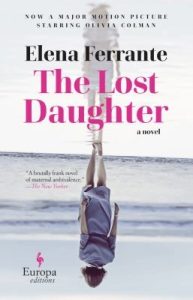 Elena Ferrante, The lost daughter; translated from the Italian by Ann Goldstein. New York, N.Y.: Europa Editions, 2021.
Elena Ferrante, The lost daughter; translated from the Italian by Ann Goldstein. New York, N.Y.: Europa Editions, 2021.
Leda, a middle-aged divorcée, is alone for the first time in years after her two adult daughters leave home to live with their father in Toronto. Enjoying an unexpected sense of liberty, she heads to the Ionian coast for a vacation. But she soon finds herself intrigued by Nina, a young mother on the beach, eventually striking up a conversation with her. After Nina confides a dark secret, one seemingly trivial occurrence leads to events that could destroy Nina’s family in this “arresting” novel by the author of the New York Times-bestselling Neapolitan Novels, which have sold millions of copies and been adapted into an HBO series (Publishers Weekly).
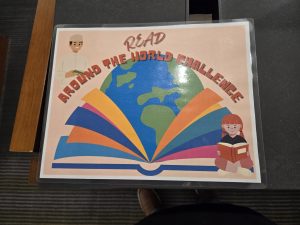
Interested in finding more book reviews of translated works from around the world? Then consult the following English-language literary journals, which regularly feature book reviews of world literature and are free to Duke University Library users with a NetID and password:
- London Review of Books
- New York Review of Books
- New Yorker
- Publishers Weekly
- TLS: Times Literary Supplement
- Kirkus Reviews
- The Atlantic Monthly
You can also consult one of the librarians of the International & Area Studies Department, who are responsible for curating the “Read Around the World” challenge.

